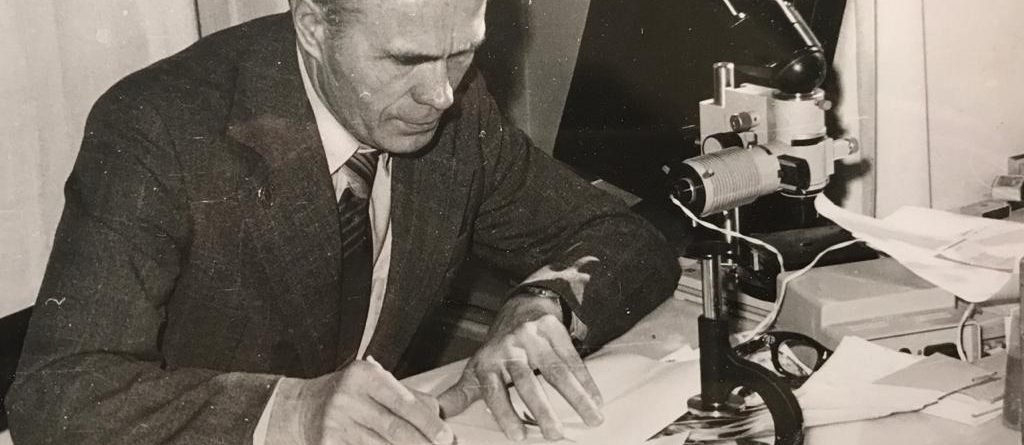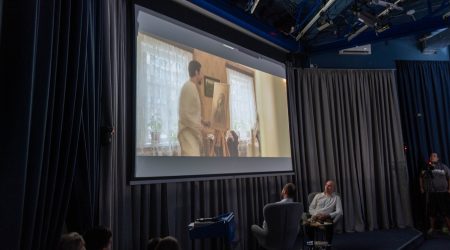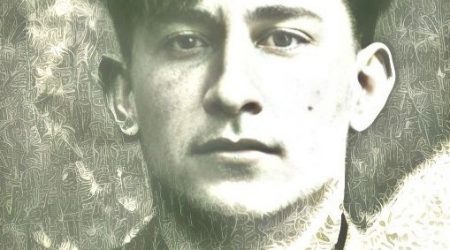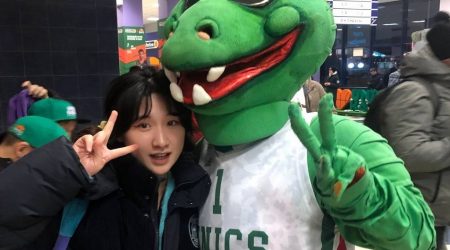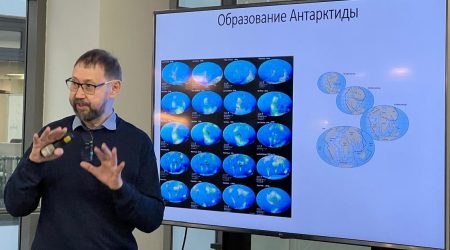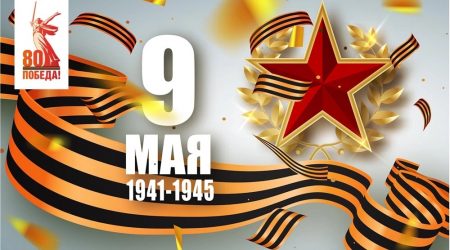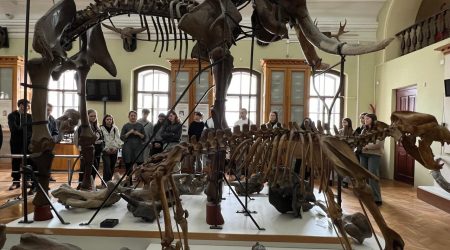Shtukenberg Geological Museum opens exhibition commemorating Professor Ivan Penkov
The exhibition commemorates his 100th anniversary.
From a school bench to the war fronts
Ivan Penkov (1923 – 2021) is warmly remembered as a prominent geologist, teacher, mentor, avid skier, gymnast, enthusiast fisher, and an overall good-hearted optimist.
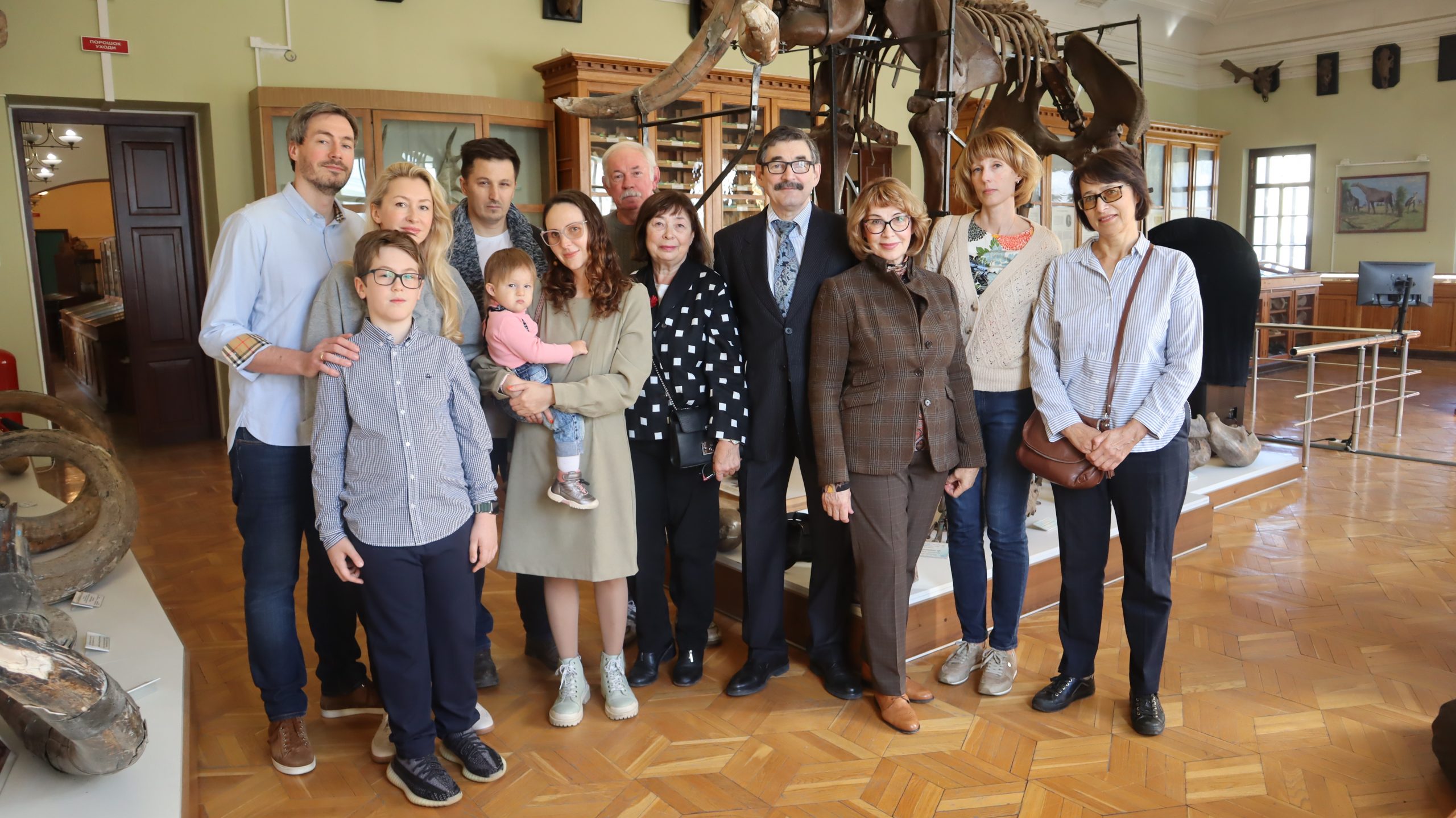
Penkov’s descendants and relatives
The future geologist was born in 1923 in the village of Sokolovka, Nikolskoe District, Penza Oblast. He grew up in a poor family: his father worked as a cooper, making barrels, and his mother was a homemaker.
When the war broke out, in 1941, 18-year-old Ivan finished the 10th grade. The young man was sent to the anti-aircraft artillery school in Gorky. He underwent an accelerated (9-month) course of military training, then in the rank of lieutenant in early 1942 went to the front. At first Ivan Nikolaevich was a commander of a firing platoon, then became the commander of a battery of small caliber anti-aircraft guns.
Through all his life Ivan Nikolaevich carried the memories of the first days at the front: scattered groups of retreating, demoralized troops, Stalin’s order №227 “Not a step back”, complete domination of the air by German aviation, the first wounded and killed.
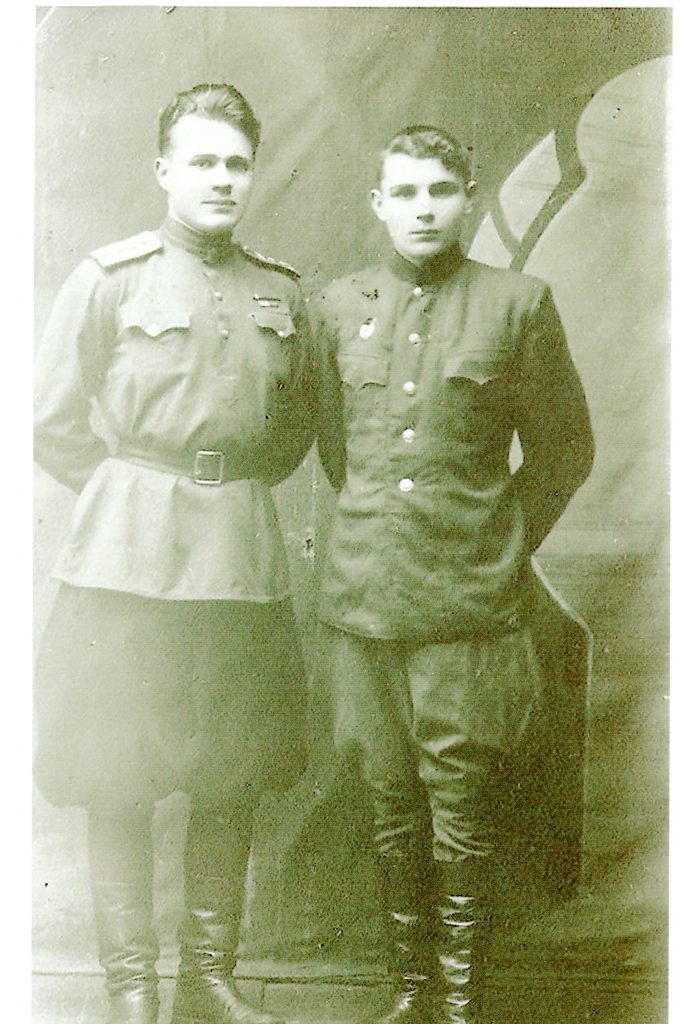
Ivan Penkov (on the left)
“How old are you, then?”
In 1943, Penkov was part of the Kursk Battle, one of the breakthrough moments of the Great Patriotic War.
His daughter Natalya shared, “Dad was reluctant to talk about the war, as the subject brought back memories of fallen comrades-in-arms. He remembered the names of all his fallen comrades and sometimes dreamed about them. Then he would go to church and put a candle for each of them. Talking about the Battle of Kursk, he said that the battle involved a huge number of troops. His task was to shoot down enemy airplanes. Once the pilot of one of the planes he shot down survived, descended by parachute. When he was taken prisoner, he asked in broken Russian to show him who shot him down. When my father came up, the prisoner shook his hand and said: “My God! How old are you, then?”
Sometimes anti-aircraft gunners had to defend not only the sky. Once, at the height of the fighting near Kursk, the Nazis suddenly broke through the defense and four German tanks jumped out at the position of Ivan Penkov’s battery.
“Father, not confused, gave the order to deploy anti-aircraft guns and shoot at the tracks. The first shell hit one tank, and it stalled. In total, they managed to disable three enemy tanks. The German attack was stopped,” Natalya explained.
«The river was boiling like water in a cauldron»
One of the most terrible memories of the war was the forcing of the Dnieper and the subsequent fighting on the bridgehead. It includes defensive and offensive operations of the Soviet troops conducted in August – December 1943 in order to liberate the Left-Bank Ukraine, Donbass, force the Dnieper and capture bridgeheads on its right bank.
“My father recalled that it was very cold, in the fall, and the incessant bombing made the river boil like water in a cauldron,” sayid Natalya. “And they had to cross to the western bank of the Dnieper with their cannons. There was nothing to make rafts out of, so they had to use gasoline barrels, tie them with wire, and lay the planking. On the raft they loaded weapons and started to move across the river. It is wide, about 2-3 kilometers. The Germans were shelling from the opposite side and from the air – it seemed unreal to survive under this barrage of fire, but they reached the western bank, where the assault units were waiting for them and jointly seized a bridgehead.”
The unit then liberated Ukraine and moved to Poland. Penkov always teared up when mentioning the horrors of Auschwitz to his family.
“When my father remembered the concentration camp, my heart clenched,” Natalya said. “He told me that when the gates were opened at Auschwitz, the prisoners came out to meet them. Emaciated, with crazy eyes… There were about 50,000 of them. Russian soldiers gave them everything they had – food supplies, warm clothes. Children were carried out in their arms. There were barracks all around, where they lived. But he didn’t talk about the Germans, probably the Nazis had left the camp before they arrived.”
“Long live the Russians!”
When the army headed for Berlin, the order came to go to Prague to support an uprising. The fact is that on the night of May 5, Czechoslovakia received news of the Soviet occupation of the German capital. Encouraged by the approach of Soviet and American troops to the border of Czechoslovakia, they decided not to wait until they were liberated and to rise up against the Nazis.
Prague was soon liberated, and Penkov celebrated the Victory Day in Czechoslovakia.
“In Prague, on the eve of Victory Day, there was a grandiose spontaneous rally where both military and civilian people mingled in general jubilation,” Natalia shared her father’s memories. “How they were welcomed in Prague was a delight! Women, old people, children – everyone came out to meet them, threw flowers, hugged the soldiers, kissed them, shouted: “Long live the Russians!” The last months of the war passed in an indomitable rush and the soldiers did not want to think about anything but victory.”
A miracle is that Ivan Penkov went through the four unspeakable years of war with only one light injury – a bullet grazed his head.
The mysterious science of geology
When the war ended, the young man – then only 22 years old – faced the question of what to do next, namely, is it worth staying in the military, since he had already been a captain by then. After some pondering, he decided to enroll in a university. He shared that his parents, who were barely literate, had always dreamed of their kids becoming educated people, and he was their main hope as the elder son in the family.
In 1947, he was admitted to the Faculty of History and Philology and then transferred to geology. Penkov became enamored with petrology and mineralogy.
After graduation, Penkov entered a PhD course and started lecturing in 1960 – his subjects were Mineral Resources and Petrology of Crystalline Rocks. He travelled extensively in various regions of Russia.

Penkov later got acquainted with physicist Ibragim Safin (1927 – 1997), who at that time constructed a device for nuclear quadrupole resonance. The equipment proved very useful in crystal chemistry and mineral lattice dynamics. Moreover, NQR was very sensitive to changes in mineral content. The effect of increased reactivity (e.g., chemisorption) in the region of phase transitions was established, which was reflected in the recommendations for selecting the most effective method of flotation (beneficiation) of antimony, arsenic and bismuth ores at the Kadamdzhai Mining and Processing Plant (Kyrgyz Republic).
The Laboratory of NQR Spectroscopy was opened in 1972. Scientists studied over 50 minerals and contributed to the understanding of the specifics of mineral genesis and forms.
 Ivan Penkov presented his DSc thesis in 1972 and was given professorship in 1973. He showed amazing longevity as a worker and continued teaching until the age of 95.
Ivan Penkov presented his DSc thesis in 1972 and was given professorship in 1973. He showed amazing longevity as a worker and continued teaching until the age of 95.
At the opening ceremony of the exhibition, Vice-Rector for Earth Sciences, Institute Director Danis Nurgaliev noted, “Not everyone can make something of their life – what Ivan Nikolaevich managed to do. He was a wonderful example for young people – was always fit, strong, and neat. He made breakthroughs in NQR and examination of mineral content.”
Director of the Center for Advanced Training Ildus Chukmarov reminisced, “I remember meeting a 95-year-old Ivan Nikolaevich at work. I instantly thought that this man is the epitome of our institution. He was fully immersed in his craft and showed us how to live life and how to work.”
“I am especially pleased to speak about Ivan Nikolaevich – my father was his university classmate,” said Chair of the Department of Paleontology and Stratigraphy Vladimir Silantyev. “It was the amazing generation of scientists which had to go to the war fronts from their graduation parties. To the end of his days, Penkov preserved his optimism, clear thinking, and love to students and the scholarly profession.”
Chair of the Department of Regional Geology and Minerals Rafael Sungatullin said, “Ivan Penkov taught me three important things in life. The first is optimism. I remember a time when I complained about my age, but he reprimanded me and said that life basically begins at 70. The second lesson is ascetism. Penkov insisted that a life without excess is the foundation of longevity. A human should have limitless spiritual appetite but limited material needs, he used to say. And the third lesson is that sports means strength. He was always physically active and even showed me some calisthenics moves which I still use.”
The renowned scientist’s son-in-law Alexander concluded, “Ivan Penkov was not only a talented scholar but also a fascinating and happy man. He brought up two wonderful daughters, saw his grandchildren and great-grandchildren, was an avid fisher and mushroom picker, partook in athletic contests and loved life in all its facets.”

